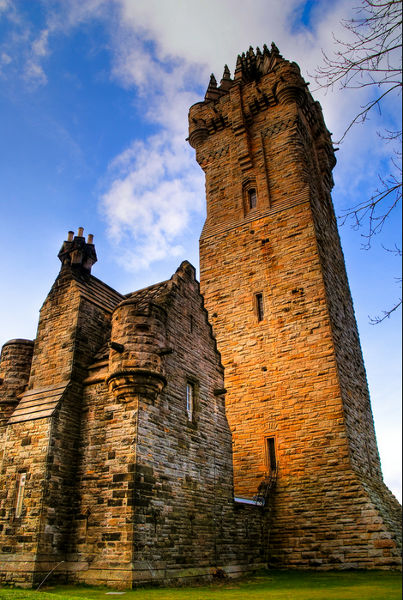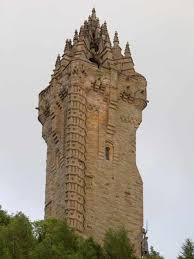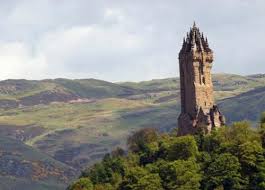The National Wallace Monument (generally known as the Wallace Monument) is a tower standing on the summit of Abbey Craig, a hilltop near Stirling in Scotland. It commemorates Sir William Wallace, a 13th-century Scottish hero.
The tower was constructed following a fundraising campaign, which accompanied a resurgence of Scottish national identity in the 19th century. In addition to public subscription, it was partially funded by contributions from a number of foreign donors, including Italian national leader Giuseppe Garibaldi. Completed in 1869 to the designs of architect John Thomas Rochead at a cost of £18,000, the monument is a 67-metre (220 ft) sandstone tower, built in the Victorian Gothic style.
The tower stands on the Abbey Craig, a volcanic crag above Cambuskenneth Abbey, from which Wallace was said to have watched the gathering of the army of King Edward I of England, just before the Battle of Stirling Bridge. The monument is open to the general public. Visitors climb the 246 step spiral staircase to the viewing gallery inside the monument's crown, which provides expansive views of the Ochil Hills and the Forth Valley.
A number of artifacts believed to have belonged to Wallace are on display inside the monument, including the Wallace Sword, a 1.63-metre (5 ft, 4 in) long sword weighing almost three kilograms. Inside is also a Hall of Heroes, a series of busts of famous Scots, effectively a small national Hall of Fame.
The original Victorian statue of Wallace stands on the corner of the monument and is by the Edinburgh sculptor David Watson Stevenson.
In 1996 Tom Church carved a statue of Wallace called "Freedom" and inspired by the film Braveheart. It has the face of Mel Gibson, the actor who played William Wallace in the film. Church leased the statue to Stirling Council, who in 1997 installed it in the car park of the visitor centre at the foot of the craig. The statue was deeply unpopular with local people and was regularly vandalised before being placed in a cage to prevent further damage. Plans to expand the visitor centre, including a new restaurant and reception, led to the unpopular statue's removal in 2008.












